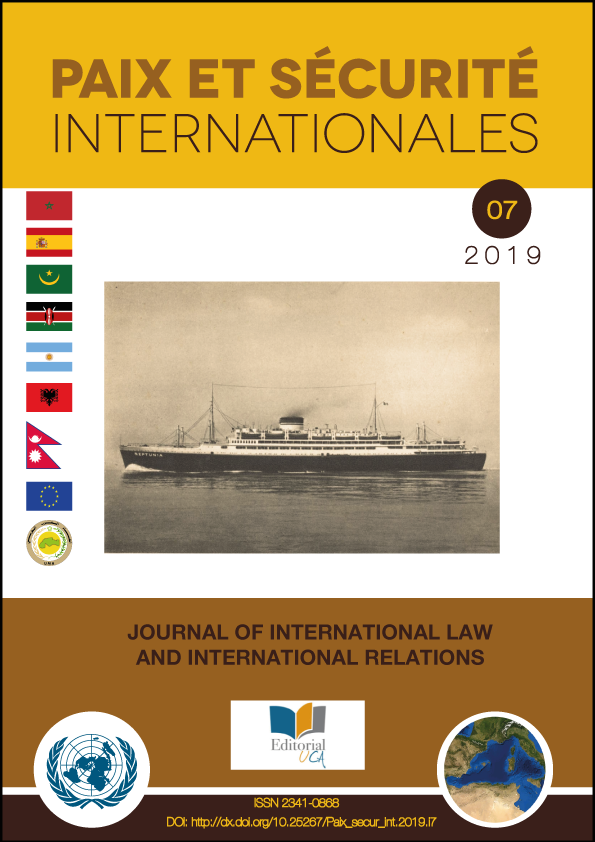The European Union and the Egyptian Neighbour: assessing the characterization of resilience as an external action priority
Abstract
The concept of resilience acquired academic momentum and pervaded a growing number of crosscutting disciplines along the second half of the twentieth century. Drawing on its epistemological flexibility, its implicit redefinition of agency and the inclusion of the parameters of uncertainty and the inevitability of crisis in its very core, it did not take long until the fields of International Relations and foreign policy-making paid thorough attention to its potential outreach and operationalization. Nor it is surprising that the European Union, imbued in a comprehensive review of its external strategy’s flaws and shortages, embraced the term as a means to underpin the paradigmatic bridge laid by the guidance of principled pragmatism. Yet, resilience-fostering can point at states or societies, and the authoritarian nature of Egypt’s regime compels to prioritize the latter, in accordance to EU’s democratic stance. The current paper will offer a brief review of EU foreign-policy approaches vis-à-vis Egypt, an European Neighbourhood Policy/Instrument walkthrough and it will aim at putting in quantitative terms what kind of resilience is the Union placing at the forefront. To conclude, a series of recommendations will be formulated for EU resilience strategy.
Keywords
Downloads
How to Cite
License
Copyright
Es condición para la publicación que el autor o autores ceda(n) a la Revista, en exclusiva, los derechos de reproducción. Paix et Sécurité Internationales es una revista que proporciona un acceso abierto inmediato a su contenido totalmente gratuito para lectores como para los investigadores que pretendan publicar en ella, ya que no se realizan cobros por concepto de envío, procesamiento ni publicación. Los usuarios podrán leer, descargar, copiar, distribuir, imprimir, buscar o enlazar el texto completo de los artículos publicados, o utilizarlos para cualquier otro propósito, dentro de la legalidad vigente. Y podrán hacerlo sin coste alguno, y sin necesitad de solicitar permiso al editor a al autor. Todo ello de acuerdo con la definición de acceso abierto de la Iniciativa Acceso Abierto de Budapest.
References
– ALIBASIC, H., “Ethics of Resiliency in Crisis Management”. In A. FARAZMAND (ed.), Global Encyclopedia of Public Administration, Public Policy and Governance, pp. 1-6, Springer International Publishing, 2018.
– COLOMBO, S. and NTOUSAS, V., “Introduction Framing Resilience: A New Pathway For EU-MENA Relations”, In S. Colombo, A, Dessí and V. Ntousas (eds.), The EU, Resilience and the MENA region, pp.11-28. Brussels, Belgium: Foundation for European Progressive Studies and Istituto Affari Internazionali, 2017.
– DESSÍ, A., “Crisis and Breakdown: How Can the EU Foster Resilience in the Middle East and North Africa?”, IAI Working Papers, nº 17, 2017. Retrieved from: https://www.iai.it/sites/default/files/iaiwp1737.pdf.
– GAHMARANOVA, A., “The Resilience Paradigm in the 2016 EU Global Strategy, the European Neighbourhood and Democratization”, Around the Caspian, 2018. Retrieved from: http://caspianet.eu/2018/11/29/the-resilience-paradigm-in-the-2016-eu-global-strategy-the-european-neighbourhood-and-democratisation/.
– GHAFAR, A.A., “A stable Egypt for a stable region: Socio-economic challenges and prospects”,EP Directorate-General for External Policies Policy Paper, 2018. Retrieved from:http://www.europarl.europa.eu/RegData/etudes/STUD/2018/603858/EXPO_STU(2018)603858_EN.pdf
– GÓMEZ ISA, F., “EU Promotion of Deep Democracy in Egypt After the Arab Spring: A missed opportunity?”, Revista Electrónica de Estudios Internacionales, 33, 2017. Retrieved from: http://www.reei.org/index.php/revista/num33/articulos/eu-promotion-of-deep-democracy-in-egypt-after-the-arab-spring-missed-opportunity.
– HAMID, S., Islamic Exceptionalism: How the struggle over Islam is reshaping the world, St. Martin Press, New York, 2016.
– HASSIB, B., “EU Cooperation with Civil Society in Egypt: Assessing the New Neighbourhood Civil Society Facility”, paper presented at the International Conference on Social Sciences and Humanities, at the Queen’s College, University of Oxford, 2018.
– MAGED, M., “SIPRI: Egypt occupies 3rd position among world’s 25 largest arms importers”, Egypt Independent, 2019. Retrieved from: https://egyptindependent.com/sipri-egypt-occupies-3rd-position-among-worlds-25-largest-arms-importers/.
– MCCARTHY, A. “Shari’a after Morsi: Egypt revolted against inept governance, not Islamic supremacism”, National Review, vol.65(14), 2013. Retrieved from:
https://go-galecom.libproxy1.nus.edu.sg/ps/i.do?p=AONE&u=nuslib&id=
GALE|A337371301&v=2.1&it=r&sid=AONE&asid=52ca8142.
– MICHOU, H., “EU-Egypt Bilateral Relations: What Scope for Human Rights Advocacy?”, EuroMed Rights Working Paper, 2016. Retrieved from: https://euromedrights.org/wp-content/uploads/2016/10/EuroMed-Rights-EU-Egypt-report-external-EN.pdf.
– MOONRISES, J. and ZENZZI, M., “In Search of a More Efficient EU Approach to Human Rights: Civil Society and EU Strategies in Egypt”, MedReset Working Papers, 16, 2018. Retrieved from: http://www.medreset.eu/wp-content/uploads/2018/07/medreset_wp_16.pdf.
– PERLMUTTER, A. “The Praetorian State and the Praetorian Army: Toward a Taxonomy of Civil-Military Relations in Developing Polities”, Comparative Politics, vol. 1, (3), pp.382-404, 1969.
– SCHULZ, M., “Logic of Consequences and Logic of Appropriateness”. In M. Augier and D. Teece (eds.), Palgrave Encyclopedia of Strategic Management, pp. 1-17, 2014. Retrieved from: http://www.martinshub.org/Download/LoC_LoA_PrePub.pdf.
– SJURSEN, H. and SMITH, K., Justifying EU foreign policy: the logics underpinning EU enlargement. In B. Torna and T. Christiansen (eds.), Rethinking European Union foreign policy, pp. 126-142, 2004.
– SOLER I LECHA, E., DEL SARTO, R. MALMVIG, H., “Interregnum: The Regional Order in the Middle East and North Africa After 2011”, MENARA Final Reports, 1, 2019. Retrieved from: http://www.menaraproject.eu/portfolio-items/interregnum-the-regional-order-in-the-middle-east-and-north-africa-after-2011/.
– SOLER I LECHA, E. and TOCCI, N., “Implications of the EU Global Strategy for the Middle East and North Africa”, MENARA Future Notes, 1, 2016. Retrieved from: https://www.iai.it/en/pubblicazioni/implications-eu-global-strategy-middle-east-and-north-africa.
– STIVATCHIS, Y., The EU and the Middle East: The European Neighbourhood Policy. In Y. Stivatchis (ed.), Conflict and Diplomacy in the Middle East, pp. 110-127, 2018. Retrieved from: https://www.e-ir.info/publication/conflict-and-diplomacy-in-the-middle-east-external-actors-and-regional-rivalries/.
– TOCCI, N., Framing the EU Global Strategy. Rome, Italy: Springer International Publishing, 2017.
– TOCCI, N., “The European Union in a changing global environment: a more connected, contested and complex world”, EEAS Working Paper, 2015. Retrieved from: http://eeas.europa.eu/archives/docs/docs/strategic_review/eu-strategic-review_executive_summary_en.pdf.






